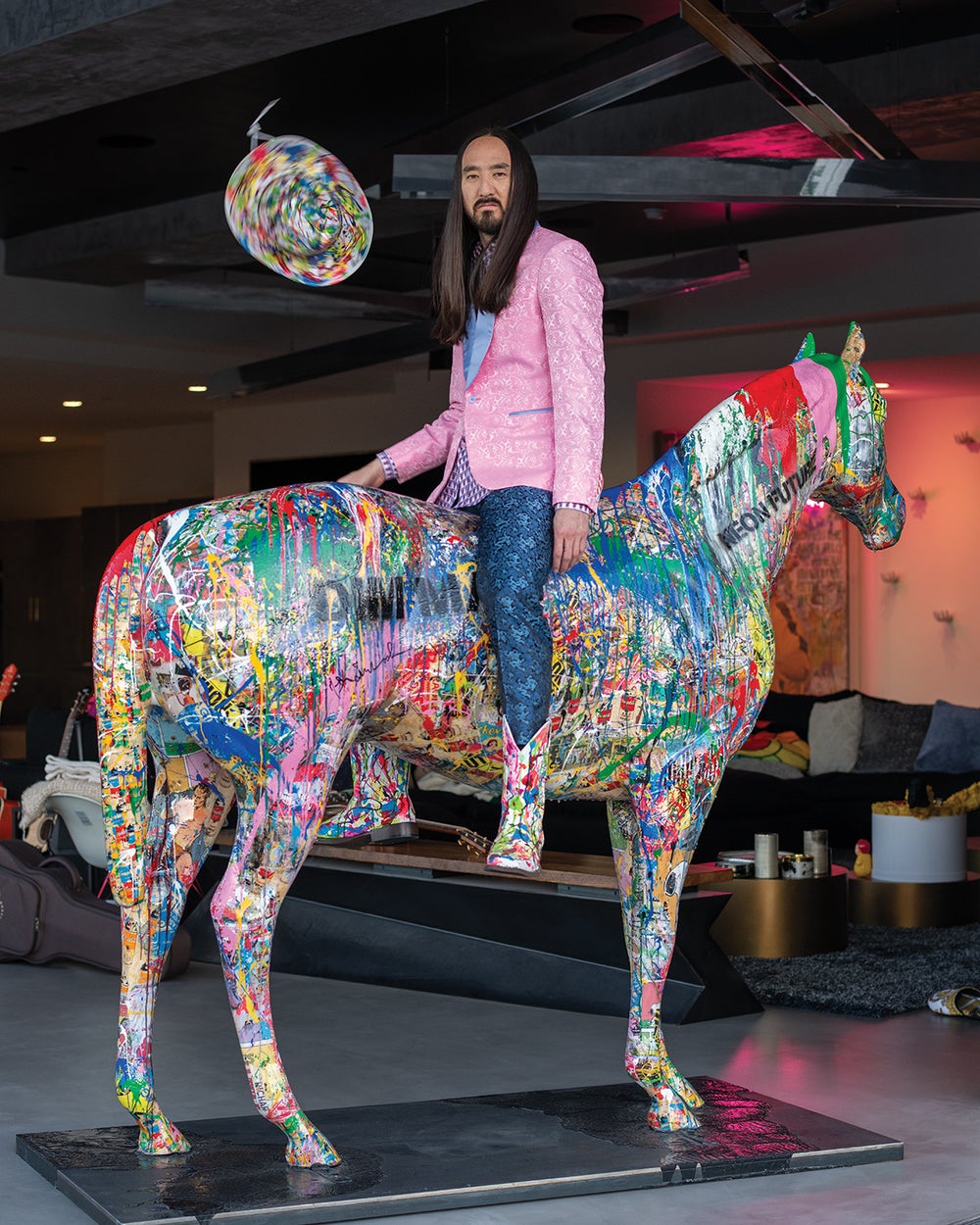Confused About Web3? Steve Aoki Dissects His Business to Show How You Can Make Money.
The DJ-turned-digital-entrepreneur has a gift for seeing the potential in strange things. Now, he's making a case for navigating the wild west of Web3.

Most people heard noise. Steve Aoki heard music.
It was just, in his words, "intentionally abrasive" music.
What's the difference between noise and intentionally abrasive? This was back in the 1990s, when Steve Aoki was a kid growing up in the California punk and hardcore music scene. Bands were playing loud, cacophonous stuff. His parents called it "devil's music." But Aoki was intrigued, because although this music turned most people off, it also drew a community together. It wasn't just garbage; it was a barrier to entry, and an appealing puzzle. "It didn't fit with the world, and that was what spoke to me," Aoki says. "You have to climb through the noise to find the gem."
In one way or another, that mindset has guided Aoki through a singular career. He is ever curious about the opportunity that others are overlooking, because it might seem too small or weird or noisy. Then, he says, he "brings that noise out from the corner and into the masses, and builds a community around it."
He is, for example, among the world's most famous DJs — the rare artist to transcend the club scene and achieve mainstream awareness. But he's also a savvy entrepreneur who absorbed brand-building lessons from his father, the founder of the successful restaurant chain Benihana. Aoki is a celebrated music producer, creator of the record label Dim Mak, as well as a clothing line called Dim Mak Collection that has partnered with the likes of Adult Swim and DC Comics — and he was recently named the "chief music officer" of Orangetheory Fitness (which means he sets the tone for the company's workout classes worldwide).
Related: Web3 Is About More Than Tech, Thanks to Its Inclusivity
Lately, he has also thrown himself headfirst into the world of Web3, and has become one of its most vocal, prominent, and successful advocates. Because these days, if you want to talk about the future of business and technology, there is no better synopsis of Web3 than "you have to climb through the noise to find the gem."
Surely you've heard of Web3 — but it is so new, and often so abstract, that the average entrepreneur may puzzle over how (or if) it's actually going to be useful. So let's back up to explain.
The current internet is known as "Web2," and is defined by intermediaries: You buy things through Amazon, you reach others through TikTok. If you play the game Fortnite, you can buy a weapon for your character in the game, but you only "own" that weapon inside the game's universe. It cannot be moved somewhere else, and Epic, the maker of Fortnite, could make it disappear at any time. Web3 promises something different: A universe where everyone who surfs the web can own their digital assets, where individuals (and companies) can easily connect and exchange things with each other without intermediaries, and where every transaction is trackable.
"Web3 is all based on the idea that when we go in, we own it," Aoki says. "Who's going to want to play in a world where they don't own stuff?"
That sounds interesting, but what does it practically mean? Admittedly, this depends on who you ask.
Critics will say we are very, very far away from making Web3 useful to the average business. Indeed, Web3 doesn't really even exist yet. The bones are there, thanks to existing blockchain technology (more on that later), but the refined visual layer we're used to in Web2 (i.e., websites to surf and things consumers can engage with) has yet to arrive and make it a fully operable ecosystem. For now, it's mostly a lot of big talk and splashy projects — something a celebrity like Aoki can capitalize on, but most people can't.
But if Web3's many evangelists (Aoki included) are correct, we are only seeing the beginning — where, yes, it may seem ridiculous that someone can sell ownership of a wacky piece of digital art called a non-fungible token (NFT) for millions of dollars (and Aoki's sold many pricey NFTs), but the future won't just be a playground for the most famous entrepreneurs. Instead, Web3 is set to become an increasingly accessible tool. It's a trajectory that most new technology follows. Before the bicycle was the bicycle, for example, it was the "dandy horse," an expensive plaything exclusively for the rich. Then the technology behind its manufacturing improved, the cost went down, and anyone could use it to ride to work.
What will Web3-for-everyone look like? Because we cannot actually see Web3 in its future form, we will instead work with the best of what we've got — Steve Aoki — and use his insights to draw a line to the average entrepreneur.
Related: Time to Reinvent: 5 Tips for Boosting Creativity and Innovation
This is Aoki's Web3 ecosystem in a nutshell: His first NFT collection, Dream Catcher, generated $4.4 million when it was released in March 2021 and set a record on Nifty Gateway, the NFT auction site where it debuted, with a piece selling for $888,000. He's since parlayed his own IP — like a comic book collaboration — into more fast-selling NFT collections. He's teamed up with Sotheby's and Lamborghini on Web3 projects and has become a brand ambassador for sports betting company DraftKing's Web3 endeavors. He's folded much of this work into his own personal Web3 ecosystem, A0K1VERSE, to which members hold a "Passport" that gains them access to special events, opportunities, and products curated by Aoki. He's done all this (and more) in less than two years.
What does that have to do with you? Aoki has ideas. So does his longtime manager, Matt Colon. And so does Chris Liquin, senior vice president of strategy at Vayner3, a Web3 consulting firm belonging to entrepreneur Gary Vaynerchuk (who isn't known to be involved in Aoki's Web3 pursuits but is working daily with entrepreneurs as they find opportunity in this space). Here, all three of them weigh in on where the average entrepreneur can uncover Web3's most immediate value.

Lesson 1: Enter with caution.
If you wanted to build a website in the 1990s, you often needed to know some HTML. Now, of course, you don't — services like Squarespace and Wix offer a beautiful, simple layer between you and a website's underlying code. You can think of today's Web3 space as the '90s all over again: To engage, you need to know some details.
Aoki admits he only "understands the broad strokes" of this world, like the basics of what a blockchain network is. (That's the core technology that fuels Web3; it's often described as a public ledger, where every transaction is permanently recorded and available for everyone to see.) While he focuses on the tangible human connections that Web3 can create — things like community-and loyalty-building, which we'll discuss later — he relies on his manager Colon to assess the technical details.
Related: Here's a Beginner's Guide to Crypto, NFTs, and the Metaverse
That's wise, says Vayner3's Liquin. Because learning which marketplaces and Web3 platforms make the most sense for your business requires seeking out both information and expertise. "Doing the research is number one," Liquin says. "Every blockchain or tech partner will pitch you a new, cool solution, and there's just so much noise in this space." If you want to engage, you need enough basic knowledge to filter that noise.
Where to start? Liquin recommends Twitter, which is where Web3 aficionados converge most readily to discuss the ecosystem. You can follow and join their conversations. Aoki recommends partnering with someone who's immersed in it, which, he cautions, may not be someone with traditional tech or business world bona fides. The ideal Web3 resume might look more like a list of blockchain conferences attended and Web3 projects contributed to than a series of impressive companies someone has worked for. "A 21-year-old kid might be way more advanced," Aoki says, than someone who's spent 20 years at Web2 powerhouses like Meta and Google. "I'd be way more comfortable with this kid that's hungry for this information," he says, than the longtime tech veteran.
If that's too much investment, you can join any number of entry-level communities that are designed to help. Media entrepreneur Randi Zuckerberg hosts one called HUG. Investor Brit Morin has another called BFF.

Lesson 2: It's all about "smart contracts."
After learning the Web3 basics from trusted developer partners, Aoki dove in headfirst. In March 2021, he minted his very first collection of NFTs — just as many other celebrities have done, with reportedly staggering profits. Aoki's team claims they earned $3.3 million in the first five minutes of release. (Although, even in a world dedicated to transparency, NFT profits are hard to confirm: Many people have been accused of secretly buying their own NFTs, or coordinating with others to buy NFTs, as a means of driving up the cost and claiming large profits — which is not to say Aoki did any of that.)
The NFT marketplace was on fire in 2021 and has significantly cooled since. Critics say it was a bubble, and woe to those who spent millions on digital art that will one day be worthless. But Web3 experts say that's fine, because NFTs as we know them were never the point. They were only the most visible usage of the technology that powers the NFTs, which has much wider and more practical potential uses.
Those things are called "smart contracts."
These contracts store the ownership history of a digital item, signify its uniqueness, and allow owners to set a price for that item and sell it to someone else. Most importantly, these contracts can be programmed to automatically carry out actions given certain inputs, and those actions are all recorded and viewable on the blockchain.
What does that mean? For NFT sales, they enable the transfer of ownership: Once the buyer sends the right amount of cryptocurrency to the seller, the transaction takes place and is forever viewable for others to see.
Related: Technology Is Already Disrupting Our Lives. What Will the Future Look Like?
But smart contracts can do much more than facilitate sales, which is why many startups are currently exploring how to turn them into a standard business tool. For instance, smart contracts could provide a level of transparency for businesses hoping to inspire trust among consumers. Say a company wants to crowdfund for a specific aspect of its business, or donate profits to a charitable organization. These are both important ways to engage a community — users like being a part of the creation of new products, and are more apt to support businesses that share their values and meaningfully act on them. But right now, consumers must take a business at its word. Was the money invested properly? Was it donated as promised? Nobody knows…but a smart contract can solve that.
"The community can all agree that, yes, this mission has been fulfilled, or yes, these funds have gone to a charitable cause we approve," says Liquin, "and then the money is released. These smart contracts can hold that money in a kind of escrow, and then deploy it towards those causes."
Smart contracts can also offer transparency in other areas of consumer concern, like supply chains. These days, consumers are attuned to the sustainability of companies' practices, and companies can use smart contracts to record and make public their supplies' origins and shipping journeys. "Smart contracts can demonstrate the authenticity of luxury goods, or the clean, ethical sourcing of raw materials through a full supply chain into the final product," Liquin says.
They can even alert business owners when something goes wrong in the shipping process, like in the case of a smart contract coded to detect if the temperature of a crate filled with perishable items gets too high or too low. If something's wrong, the contract might ensure the business saves its money. Or, they could improve employee loyalty at a company: Smart contracts can be programmed to trigger bonus payments to employees who meet certain goals, or to increase transparency about salaries across large sets of workers. Yes, these things can all be done manually now, but Web3 evangelists argue that smart contracts make things more efficient and trustworthy.

Lesson 3: The secondary market awaits!
Artists have a problem: They often cannot sell their work directly to consumers. It's just too difficult, which is why art galleries and record labels exist — helping facilitate distribution and sales, and then taking a cut of the profits. If an artist makes something unique, they might be able to sell it to a fan once…but if it becomes extremely valuable, and the item gets resold for a profit, the original artist never profits again.
For this reason, Web3 has been especially appealing to artists like Aoki. It gives them more control over what is sold, and more ways to profit off of what is resold.
Aoki experimented with this in 2021, when he became an equity partner and cofounder in a company called MetaZoo. It makes trading cards, Pokémon-style, that feature mythical creatures, which immediately excited Aoki. "It literally was an instantaneous — 'Wow, this is a goldmine IP,'" he says. In April, according to Aoki and his team, MetaZoo sold more than $2 million worth of skateboard decks with its logo on them in just 14 minutes. Aoki even sold MetaZoo cards with CDs of his album, HiROQUEST: Genesis, in September, precipitating the sale of more than 27,000 CDs.
No one gets that excited about CDs these days, but Aoki knows why people see value in them: "The reason why people are obsessed with getting these products, like the skateboard decks, is that they're selling for like $60 when we launched it, and they're selling on the secondary market for $200, $300," Aoki says. "In the last 16 months, we've already grossed over $50 million in revenue. It's my Beats by Dre."
Most entrepreneurs can't rely on their personal cachet to sell out a "Beats by Dre"-level NFT collection, of course. But Web3 smart contracts, which can be preprogrammed to give royalties to whoever originally created an asset, could open a world of new possibilities. That's because these NFTs can be paired with things that customers might want to resell — whether that's a car or a comic book.
They can also be paired to things that already have real-world value, but that just weren't as easy to execute before. For example, consider Gary Vaynerchuk's "Dinner Deer" NFT. It is an amateurish digital doodle that seems worthless until you read what its ownership entails: There are 10 Dinner Deers, and everyone who owns one can join a 90-minute dinner with Vaynerchuk. He's hosting one every year for three years. The NFT, therefore, is a ticket to sit down with one of the most in-demand entrepreneurs in the world — something that has inherent value, regardless of Web3. But the NFT element makes it easy for owners to resell the ticket, which will go up and down in value.

Lesson 4: Build a community.
Selling products is one thing — but as any entrepreneur knows, and as Aoki has learned in the music world, community is everything. That's why, after his success with the MetaZoo NFTs, Aoki started thinking: "We already have this substantial, healthy secondary community that supports the ecosystem of MetaZoo," Aoki says. So how could he bring them together?
His answer: We're going to create tokens that give them early access to products. The tokens, which are a kind of digital currency, would be the rewards for people's loyalty: They could collect them, trade them, and then spend them on special benefits. Aoki says it worked; not only did future product releases sell out quickly, but he could see these collectors talking and trading among themselves, as they bonded into an online community of fans.
When evangelists talk about the power of Web3 technology, this is a theme they always come back to: It facilitates community. Of course, you don't need Web3 to build a community — there are endless ways to do that already. So what's better about Web3?
Advocates often describe a kind of technologically-backed psychology: Sure, someone could be part of some Facebook group now, but that membership doesn't have tangible value. When people have something like a digital token, and that token can be resold, it gives people a feeling of ownership. It's like owning company stock — except that stock also gains them access to special company events. That, in turn, makes them feel like they're part of a special club.
These things all exist and could be done using current platforms, but Web3 combines a lot of these functions in one simple piece of technology. Plus, today's Web3 early adopters are really into interacting with others who are part of their communities, often using communication tools like Discord to stay in regular contact. People like Aoki are betting that, as more people engage in Web3, they'll become similarly engaged.
Related: Why an Entrepreneur's Ability to Innovate Will Make (or Break) Future Success
That's why Aoki wanted to focus on building a community that was truly his. So in February 2022, he launched what he calls A0K1VERSE. Futuristic as it sounds, you don't need to enter some virtual space to find it: People can just go to the website a0k1verse.xyz. (Dot-xyz has become the Web3 community's extension of choice; many other companies in the space also use it.) There, they can buy a "Passport" that gains them access to what is essentially a Web3-enabled fan club full of perks. The way he sees it, A0K1VERSE Passport holders "aren't fans. They're members in our group that are really interested in the whole network of the IP, or the company, Steve Aoki."
Just like any tech build today, Web3 projects are made with third-party partnerships. In Aoki's case, a company called Manifold powers the Passport, and his virtual events for Passport-holders are hosted in metaverse platforms like The Sandbox. These companies are part of an ecosystem of third-party Web3 programs that are rising to work with brands — not just celebrities.
"If you're building a product, any entrepreneur knows that you need as much customer feedback as possible," Liquin says. "These programs could let you give access — not to yourself as the entrepreneur — but to new features that you're considering rolling out." One of the more high-profile ones, for example, is a company called Try Your Best, founded by former Outdoor Voices leader Ty Haney. Its pitch to consumers: "Become a member to cocreate with the brands you love." In short, the company creates spaces for a brand's fans to meet, engage, earn tokens, and share feedback.
"As that brand grows, as those products improve, and as you as a user keep using those products, you now have this vested stake," Liquin says. "It's not ownership, or a security, but it is an asset that links you directly to this company and their goals. That alignment of incentives is really powerful for loyalty."

Lesson 5: Embrace loyalty programs and utility tokens.
Why would someone keep coming back to the A0K1VERSE? Aoki's answer: Because the more they engage (and spend), the more access they get via "Credits," of which there are 25,000 total in supply — either purchasable by fans or given away through various promotions. Aoki sent Credits to people who'd purchased an NFT from him prior to A0K1VERSE. He also built bridges to other NFT communities — like collectors of NFTs by the DJ 3LAU, who Aoki has worked with on multiple projects — so that those fans could enjoy status in his world too.
Aoki sells the remaining Credits for $130, although the price fluctuates, same as any digital asset. One credit gets you things like previews of his unreleased music and access to his exclusive A0K1VERSE chatroom. Four credits include perks like "guestlist privileges on select Steve Aoki live performances." And the top rank, at 1,024 credits, allows you to record a song with Aoki himself. So far a few people have reached that level, but no songs have been recorded…yet.
Related: 6 Ways to Leverage Technology to Rock Your Digital Relevance
In addition to being a community, Aoki sees all this as a richly enabled loyalty program — which is another thing Web3 evangelists often tout. This technology, they say, makes loyalty programs richer and more interesting.
Of course, just like before, there are plenty of non-Web3 loyalty options today: Companies like Belly facilitate them for small businesses, and large businesses from Starbucks to Hilton built and manage their own. But a crop of Web3 startups claims that "the future of memberships will be powered by NFTs," as the website for the loyalty company Hang says. (Hang, which announced a $16 million Series A round this year, has already run programs for big brands including Budweiser and Pinkberry.) They argue that Web3-based assets like NFTs make loyalty programs more dynamic, exciting, and profitable.
The programs can also become more efficient, thanks to the nature of smart contracts. For example, Aoki recently wanted to add a perk for his A0K1VERSE fans: access to an exclusive Halloween event. It was easy, says Colon: It was just a matter of telling people, "I got your contract code. All your community members are already included, don't worry," says Colon. "Twenty-five hundred people [from A0K1VERSE] are now automatically able to purchase tickets."

So, when's all of this coming?
Despite Aoki's enthusiasm for Web3, he and Colon admit: It's not transforming their lives just yet. "Somewhere between 10% to 20% of [Steve's] business is Web3-based," Colon says. Live touring remains Aoki's bread and butter, with brand partnerships coming in as a "relatively distant second." He hasn't lost sight of either of those revenue streams, though, by diving into Web3. "We've gotten to a great place where the three feed each other," Colon says.
For example, A0K1VERSE grants token-holding members tickets to live shows and products created with Aoki's brand partners. Most of those brand partners are collaborating on Web3 products with Aoki, which he can in turn promote at his live shows, where A0K1VERSE members get special access and fuel the hype.
Web3 could prove to be transformative. Or it could prove to be a lot of hype about nothing — just an incredibly complicated way of doing things we're already doing perfectly well. When it's this early, it's hard to say. But as more startups begin offering Web3-based services, it will become easier and easier to engage with them — and, if you're like Aoki and enjoy being able to "climb through the noise to find the gem," there's plenty of noise to climb through.
"We are literally creating our own culture and community, and building our own narrative and ecosystem," Aoki says. It reminds him a lot of those early days in the hardcore music scene. Except this time, he's excited for others to hear the music too.
Related: How to Tap Into Innovation, the Most Essential Part of Your Entrepreneurial Journey
Entrepreneur Editors' Picks
-
Online Scams Are More Sophisticated Than Ever. Here's How to Shop Safely on Black Friday and Cyber Monday, According to a Cyber Intelligence Expert.
-
This Guy Saved Barbie From Cultural Extinction. He Did It by Asking One Big Question.
-
The Top 5 Hot Franchise Categories for 2023, According to One Industry Expert
-
Why Can't We Resist Black Friday and Cyber Monday? A Behavioral Economist Explains the Psychological Forces That Make Sales Irresistible.
-
I Couldn't Sleep. I Obsessed Over My Failures. Then I Found the Weirdest Cure.
-
This Pitch Scored a $250,000 Investment — But It Almost Didn't Happen
-
Employees Were Demanded to Go Home. Here's How We Invite Them to Come Back.





